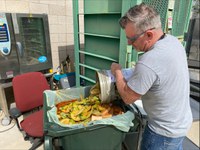From Food Scraps to Fertile Soil: Innovative Sustainability Pilot Project
This year, the City started a one-year pilot project that is testing food scrap diversion at two different food preparation sites: the City of Albuquerque’s Department of Senior Affairs CASA Kitchen, which prepares around 1,000 meals each day; and Explora’s new concessions, run by Three Sister’s Kitchen. Coordinated by the Sustainability Office, local hauler Little Green Bucket transports the compostable materials to Soilutions, where they are turned into finished compost.
“Albuquerque is paving the path toward a more climate resilient future,” said Sandra West, City of Albuquerque’s Sustainable Waste Specialist. “Together, we are utilizing nature’s process of recycling nutrients in kitchen scraps to reduce greenhouse gas emissions, work towards the Climate Action Plan goals, and build healthy local soils.”
About a third of the food supply in the United States ends up going to waste, and the Natural Resources Defense Council estimates that 112,000 tons of food is wasted in Albuquerque each year. Diverting those items from the landfill and turning them into compost avoids methane emissions and creates a valuable soil amendment material that supports soils and plants, reducing greenhouse gasses. The pilot has already diverted 164 cubic feet of material from the landfill.
“As an organization committed to improving community health and the environment, diverting food scraps and food packaging from landfills is important to us,” said Anzia Bennett, Three Sisters Kitchen’s Executive Director. “We're thrilled for the opportunity to partner with the City to implement compost collection at our cafe at Explora.”
“As a local, community-centered food scrap collection business, we are happy to support the City’s work to direct compostable materials to feeding soils instead of landfills,” said Brad Weikel, Founder of Little Green Bucket.
The pilot lays the foundation to create a community that is working on waste reduction across the food chain, identifying ways to save food and money. Data collected during the project will inform future sustainable waste work at the City.

